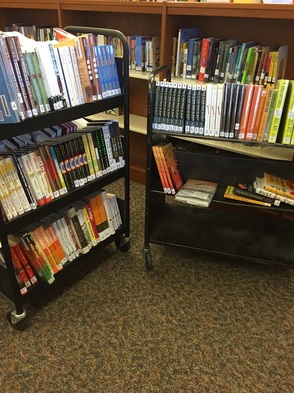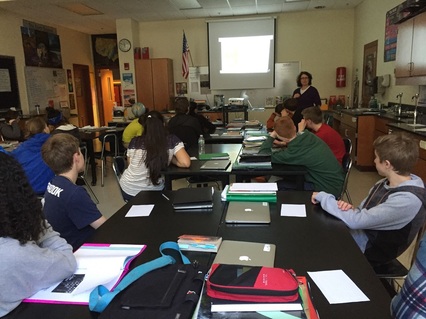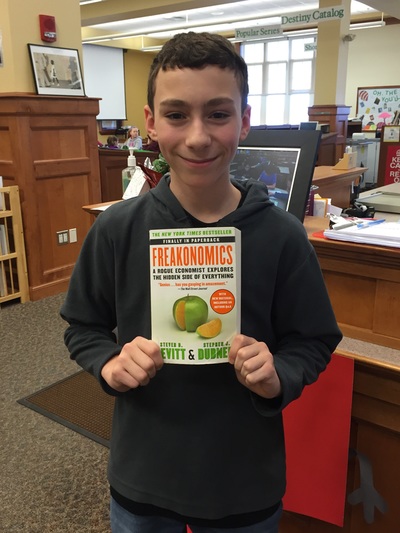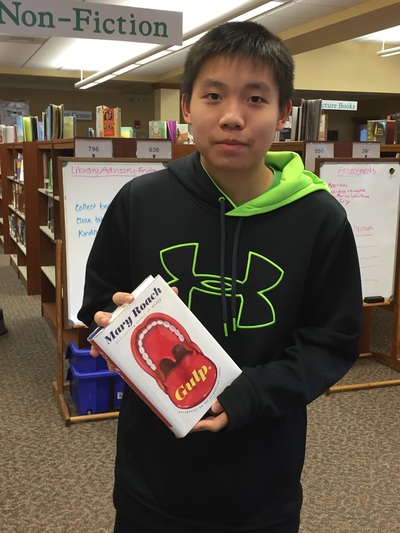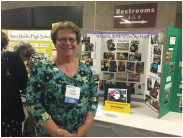
Amy Bloom is a Librarian at the Wilson Middle School in Natick, MA
and a winner of a 2016 MSLA Super-Librarian award
Last March, an 8th grade science teacher came to me with an article she had read. The article, titled "Popular Science Nonfiction and the Connection Between Literacy and the NGSS" by Elizabeth Lamond Price, presented the idea of exposing students to the writings of authors who bring science to life in a way a novice can appreciate and understand. Could we get students to engage with science topics and the implication for society? What excited us both about this assignment was that we could encourage students to explore an interest in a specific area of science, expose them to influential writers in the science fields, as well as meet the literacy standards in the Next Generation Science Standards and the Common Core.
Once we agreed that this had the potential to extend learning for all of her students, we set our timeline, and got to work creating a list of books that address science and its impact on society. Ms Pogarian (the 8th grade teacher) had a strong reading background in the adult popular nonfiction science titles, and I added titles from young adult nonfiction writers Jim Murphy, Marc Aronson, Tanya Lee Stone, Steven Sheinkin and Paul Fleishman. I reviewed the NSTA Outstanding Science Trade Books for Students K–12, AAAS/Subaru SB&F Prize for Excellence in Science Books, and also added those adult titles with a young adult adaptation.
We created a slide presentation of the titles with a “blurb” about each book, and scheduled class time to introduce the project to our students. If you have ever worked with 8th graders, you know that there is a selling process that goes on in getting them invested in a new learning opportunity - especially when introducing it mid-April. We gave a 30-second book talk on each title, highlighting the gross (Phineas Gage) things they could relate to (This Is your Brain on Music) and the movie connections (Trapped:How the World Rescued 33 Miners from 2,000 Feet Below the Chilean Desert). The presentation was then shared with them using google drive, and students made their 1st, 2nd, 3rd and 4th choices in a google form.
Locating books for 100 students was a challenge, we pulled from all libraries in the area, as well as our own personal collections. I started stalking every “friends of the library” sale that I could find, and became a regular at our local thrift stores, including Savers. We were able to provide students with one of their top 3 choices.
Our original plan was for students to keep a note taker as they read, and write a book review, critically analyzing the book. They would then create a video of themselves giving the book review. Unfortunately, we ran out of time, and the written piece had to suffice.
In our reflection of the assignment we took note of several things we needed to adapt for the next year:
- Timing: We need to allow a full 8 weeks for the assignment, especially if we wanted to add the oral component. We also decided that having students work in pairs to create an NPR podcast would be an interesting approach for students to take and meet the speaking and listening standards as well as the writing standards.
- It is important to bring special educators into the planning process. They know those struggling readers and how best to engage them. Providing an audio version of the books, if available, is also helpful for students who need that support.
- Materials: We wanted to bring the entire 8th grade (230 students) on board with this assignment for 2015-2016, so it was important that we get more resources. We applied for, and received a grant from our local education foundation (Natick Education Foundation) who is always looking for ways to support science initiatives.
- We had the data on the most popular book choices and could use that information to guide our purchases.
It is one year later, we rolled the project out the first week of March to all 8th graders, and for me, it has already been a success. Students actively engaged in the presentation, sharing their thoughts on those titles they had read, or were interested in reading, taking notes on titles that sparked their interest, and comparing thoughts with their friends. Books have been passed out, and students are reading. I look forward to reading their reflections and hearing their podcast review of the books.
Science Scope Sept. 2014: 63-68. Print.

